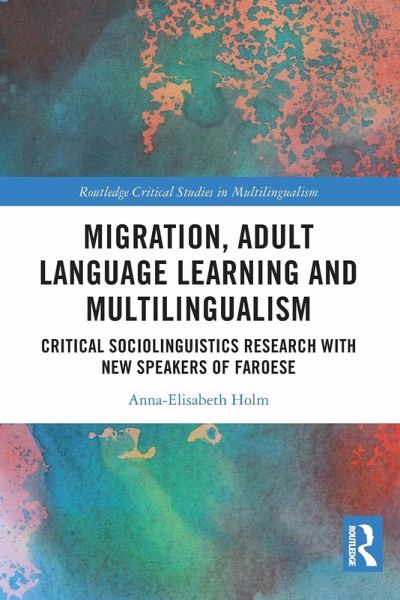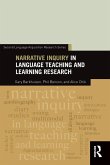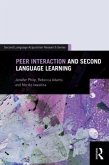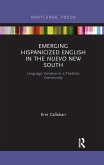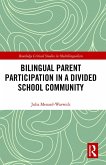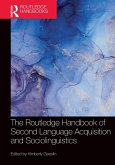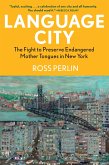Anna-Elisabeth Holm
Migration, Adult Language Learning and Multilingualism
Critical Sociolinguistics Research with New Speakers of Faroese
Anna-Elisabeth Holm
Migration, Adult Language Learning and Multilingualism
Critical Sociolinguistics Research with New Speakers of Faroese
- Broschiertes Buch
- Merkliste
- Auf die Merkliste
- Bewerten Bewerten
- Teilen
- Produkt teilen
- Produkterinnerung
- Produkterinnerung
This book focuses on the nexus of migration, adult language learning, and multilingualism of migrants in the Faroe Islands. This volume will be of interest to students and scholars in critical sociolinguistics, linguistic anthropology, language education, migration studies, and applied linguistics.
Andere Kunden interessierten sich auch für
![Narrative Inquiry in Language Teaching and Learning Research Narrative Inquiry in Language Teaching and Learning Research]() Gary BarkhuizenNarrative Inquiry in Language Teaching and Learning Research71,99 €
Gary BarkhuizenNarrative Inquiry in Language Teaching and Learning Research71,99 €![Globalization and Language Teaching Globalization and Language Teaching]() David Block (ed.)Globalization and Language Teaching71,99 €
David Block (ed.)Globalization and Language Teaching71,99 €![Peer Interaction and Second Language Learning Peer Interaction and Second Language Learning]() Jenefer PhilpPeer Interaction and Second Language Learning82,99 €
Jenefer PhilpPeer Interaction and Second Language Learning82,99 €![Emerging Hispanicized English in the Nuevo New South Emerging Hispanicized English in the Nuevo New South]() Erin CallahanEmerging Hispanicized English in the Nuevo New South33,99 €
Erin CallahanEmerging Hispanicized English in the Nuevo New South33,99 €![Bilingual Parent Participation in a Divided School Community Bilingual Parent Participation in a Divided School Community]() Julia Menard-WarwickBilingual Parent Participation in a Divided School Community64,99 €
Julia Menard-WarwickBilingual Parent Participation in a Divided School Community64,99 €![The Routledge Handbook of Second Language Acquisition and Sociolinguistics The Routledge Handbook of Second Language Acquisition and Sociolinguistics]() The Routledge Handbook of Second Language Acquisition and Sociolinguistics65,99 €
The Routledge Handbook of Second Language Acquisition and Sociolinguistics65,99 €![Language City Language City]() Ross PerlinLanguage City18,99 €
Ross PerlinLanguage City18,99 €-
-
-
This book focuses on the nexus of migration, adult language learning, and multilingualism of migrants in the Faroe Islands. This volume will be of interest to students and scholars in critical sociolinguistics, linguistic anthropology, language education, migration studies, and applied linguistics.
Hinweis: Dieser Artikel kann nur an eine deutsche Lieferadresse ausgeliefert werden.
Hinweis: Dieser Artikel kann nur an eine deutsche Lieferadresse ausgeliefert werden.
Produktdetails
- Produktdetails
- Verlag: Taylor & Francis Ltd
- Seitenzahl: 222
- Erscheinungstermin: 14. April 2025
- Englisch
- Abmessung: 229mm x 152mm
- ISBN-13: 9781032371528
- ISBN-10: 1032371528
- Artikelnr.: 73494388
- Herstellerkennzeichnung
- Libri GmbH
- Europaallee 1
- 36244 Bad Hersfeld
- gpsr@libri.de
- Verlag: Taylor & Francis Ltd
- Seitenzahl: 222
- Erscheinungstermin: 14. April 2025
- Englisch
- Abmessung: 229mm x 152mm
- ISBN-13: 9781032371528
- ISBN-10: 1032371528
- Artikelnr.: 73494388
- Herstellerkennzeichnung
- Libri GmbH
- Europaallee 1
- 36244 Bad Hersfeld
- gpsr@libri.de
Anna-Elisabeth Holm works at the University of the Faroe Islands. Her doctoral research was completed at Heriot-Watt University, Edinburgh. Her main research interests include sociolinguistic ethnography, language education for adult migrants, multilingualism in peripheral regions, and language policy and practice. Recent publications include: Holm et al. (2020). "Employers could use us, but they don't": voices from blue-collar workplaces in a northern periphery. Language Policy, Vol. 19, Issue 3, pp. 389-416; Hoffmann & Holm (2022). Learning Insular Nordic Languages: Comparative Perspectives on Migrants' Experiences Learning Faroese and Icelandic. Nordic Journal of Migration Research, Vol. 12, Issue 3.
1 Introduction
A study with new speakers of Faroese
Objectives and research questions
The significance of the study and its contribution to research
My own trajectory and my own perspectives as a researcher
Overview of the volume
Notes
References
2 New times in the Faroe Islands: The social and historical context
Introduction
The socio-historical context for the study
A historical portrayal of the sociolinguistic context
'Normalization' efforts: Language policy and planning
New times and a changing sociolinguistic landscape
Mobility and migration: Part of the culture
Contemporary trends in in-migration in a changing sociolinguistic landscape
Migrants, public discourses and integration policy and initiatives
Characteristics of the labour market
Multilingualism in the periphery
Faroese as an Additional Language: Challenges and opportunities
Availability of courses in Faroese language and culture
Notes
References
3 The conceptual framing of my research in the Faroes
Introduction
Conceptual shifts within sociolinguistics in the wake of globalisation
A shift towards globalisation and contemporary mobilities
A shift towards speaker trajectories
A shift towards superdiversity, in rural areas as well as urban areas
A shift towards the notion of new speaker (as opposed to non-native
speaker)Recent research on language and transnational migration and the
view from the periphery
Language, migration and contemporary workplaces
Language, border crossing and residence rights
The view from the periphery
Research into adult language learning in the context of migration
The limitations of the traditional research approach to second language
acquisition
A critical framework focusing on situated investment in language learning
An extended model of investment in language learning
Capital
Identity
Ideology
Adapting the extended model of investment in language learning to my
research in the Faroes
Notes
References
4 Research methodology
Introduction
Critical sociolinguistic ethnography
Fieldwork, methods and data collection
Visits to the field: Moving from observer to co-worker
The first phase: scoping the field
The second fieldwork visit: Identifying research sites
A brief third visit
The fourth and fifth fieldwork visits: Moving from observer to worker
The sixth fieldwork visit
Other visits and data gathering opportunities
Recruiting research participants
The research participants
The focal participants
Research sites: blue-collar workplaces
A multilingual cleaning company
The two fish-processing plants
The semi-structured interviews with the participants
Interviews with employers in blue-collar workplaces
My researcher diary, observations and the ethnographic protocols
Other ethnographic data: Documents and photographs
Ethics, reflexivity and researcher positioning
Ethical considerations
Researcher positioningMy approach to data analysis
Notes
References
5 Linguistic resources and language learning trajectories
Introduction
Linguistic resources and funds of knowledge from the country of origin
Alex
David
Anna
Joanna
Natalia
New linguistic resources developed in the Faroes
Alex - a case of non-investment in new linguistic resources
David's disposition and reasons for not investing in Faroese
Anna's continuous investment in learning Faroese
Joanna's investment in Faroese and reflections on deskilling
Natalia, a proficient new speaker of Faroese
Language learning as situated practice
Notes
References
6 Linguistic resources and identities at work
Introduction
Fish-processing plants as workplaces in the Faroes
Workplace observations during the first phase of fieldwork
More detailed observations in one factory during the second phase of
fieldwork
Five focal participants: Language resources, funds of knowledge and
identities
Jelena
Nita
Eunita
Lea
NataliaIdentity disruption in the context of migration
Note
References
7 Language ideologies
Introduction
Ideologies and ideological currents in contemporary public discourses
Media discourse in the Faroes about adult migrants' language learning and
about 'integration'
The participants' perceptions of the value of Faroese and the ideological
conditions for language learning
Participants' perceptions of the value of Faroese
Media representations of adult learners, their lived experiences of
language learning and their positioning as new speakers of Faroese
The value and significance of Danish in Faroese society: Differing
viewpoints among the particpants
Lea's language learning dilemma: Pride and affiliation or profit?
The shaping of views through lived experience: Participants' encounters
with Danish
A dual language learning barrier to labour market advancement: Helena's
views and experiences
Public discourses regarding other languages
Ideologies regarding bilingualism and multilingualism
English as the new lingua franca: A neutral vehicle of communication? A
highly valued asset?
Notes
References
8 Conclusion
Introduction
Revisiting the research questions and summary of findings
Research question 1
Research questions 2 and 3
Research question 4Directions for future research
Faroese as an Additional Language (FAL)
Understanding investment in language learning: a diary study with a small
group of focal participants
Multilingualism as added value
Language, inclusion and labour markets
The policy implications of the research
Note
References
Index
A study with new speakers of Faroese
Objectives and research questions
The significance of the study and its contribution to research
My own trajectory and my own perspectives as a researcher
Overview of the volume
Notes
References
2 New times in the Faroe Islands: The social and historical context
Introduction
The socio-historical context for the study
A historical portrayal of the sociolinguistic context
'Normalization' efforts: Language policy and planning
New times and a changing sociolinguistic landscape
Mobility and migration: Part of the culture
Contemporary trends in in-migration in a changing sociolinguistic landscape
Migrants, public discourses and integration policy and initiatives
Characteristics of the labour market
Multilingualism in the periphery
Faroese as an Additional Language: Challenges and opportunities
Availability of courses in Faroese language and culture
Notes
References
3 The conceptual framing of my research in the Faroes
Introduction
Conceptual shifts within sociolinguistics in the wake of globalisation
A shift towards globalisation and contemporary mobilities
A shift towards speaker trajectories
A shift towards superdiversity, in rural areas as well as urban areas
A shift towards the notion of new speaker (as opposed to non-native
speaker)Recent research on language and transnational migration and the
view from the periphery
Language, migration and contemporary workplaces
Language, border crossing and residence rights
The view from the periphery
Research into adult language learning in the context of migration
The limitations of the traditional research approach to second language
acquisition
A critical framework focusing on situated investment in language learning
An extended model of investment in language learning
Capital
Identity
Ideology
Adapting the extended model of investment in language learning to my
research in the Faroes
Notes
References
4 Research methodology
Introduction
Critical sociolinguistic ethnography
Fieldwork, methods and data collection
Visits to the field: Moving from observer to co-worker
The first phase: scoping the field
The second fieldwork visit: Identifying research sites
A brief third visit
The fourth and fifth fieldwork visits: Moving from observer to worker
The sixth fieldwork visit
Other visits and data gathering opportunities
Recruiting research participants
The research participants
The focal participants
Research sites: blue-collar workplaces
A multilingual cleaning company
The two fish-processing plants
The semi-structured interviews with the participants
Interviews with employers in blue-collar workplaces
My researcher diary, observations and the ethnographic protocols
Other ethnographic data: Documents and photographs
Ethics, reflexivity and researcher positioning
Ethical considerations
Researcher positioningMy approach to data analysis
Notes
References
5 Linguistic resources and language learning trajectories
Introduction
Linguistic resources and funds of knowledge from the country of origin
Alex
David
Anna
Joanna
Natalia
New linguistic resources developed in the Faroes
Alex - a case of non-investment in new linguistic resources
David's disposition and reasons for not investing in Faroese
Anna's continuous investment in learning Faroese
Joanna's investment in Faroese and reflections on deskilling
Natalia, a proficient new speaker of Faroese
Language learning as situated practice
Notes
References
6 Linguistic resources and identities at work
Introduction
Fish-processing plants as workplaces in the Faroes
Workplace observations during the first phase of fieldwork
More detailed observations in one factory during the second phase of
fieldwork
Five focal participants: Language resources, funds of knowledge and
identities
Jelena
Nita
Eunita
Lea
NataliaIdentity disruption in the context of migration
Note
References
7 Language ideologies
Introduction
Ideologies and ideological currents in contemporary public discourses
Media discourse in the Faroes about adult migrants' language learning and
about 'integration'
The participants' perceptions of the value of Faroese and the ideological
conditions for language learning
Participants' perceptions of the value of Faroese
Media representations of adult learners, their lived experiences of
language learning and their positioning as new speakers of Faroese
The value and significance of Danish in Faroese society: Differing
viewpoints among the particpants
Lea's language learning dilemma: Pride and affiliation or profit?
The shaping of views through lived experience: Participants' encounters
with Danish
A dual language learning barrier to labour market advancement: Helena's
views and experiences
Public discourses regarding other languages
Ideologies regarding bilingualism and multilingualism
English as the new lingua franca: A neutral vehicle of communication? A
highly valued asset?
Notes
References
8 Conclusion
Introduction
Revisiting the research questions and summary of findings
Research question 1
Research questions 2 and 3
Research question 4Directions for future research
Faroese as an Additional Language (FAL)
Understanding investment in language learning: a diary study with a small
group of focal participants
Multilingualism as added value
Language, inclusion and labour markets
The policy implications of the research
Note
References
Index
1 Introduction
A study with new speakers of Faroese
Objectives and research questions
The significance of the study and its contribution to research
My own trajectory and my own perspectives as a researcher
Overview of the volume
Notes
References
2 New times in the Faroe Islands: The social and historical context
Introduction
The socio-historical context for the study
A historical portrayal of the sociolinguistic context
'Normalization' efforts: Language policy and planning
New times and a changing sociolinguistic landscape
Mobility and migration: Part of the culture
Contemporary trends in in-migration in a changing sociolinguistic landscape
Migrants, public discourses and integration policy and initiatives
Characteristics of the labour market
Multilingualism in the periphery
Faroese as an Additional Language: Challenges and opportunities
Availability of courses in Faroese language and culture
Notes
References
3 The conceptual framing of my research in the Faroes
Introduction
Conceptual shifts within sociolinguistics in the wake of globalisation
A shift towards globalisation and contemporary mobilities
A shift towards speaker trajectories
A shift towards superdiversity, in rural areas as well as urban areas
A shift towards the notion of new speaker (as opposed to non-native speaker)
Recent research on language and transnational migration and the view from the periphery
Language, migration and contemporary workplaces
Language, border crossing and residence rights
The view from the periphery
Research into adult language learning in the context of migration
The limitations of the traditional research approach to second language acquisition
A critical framework focusing on situated investment in language learning
An extended model of investment in language learning
Capital
Identity
Ideology
Adapting the extended model of investment in language learning to my research in the Faroes
Notes
References
4 Research methodology
Introduction
Critical sociolinguistic ethnography
Fieldwork, methods and data collection
Visits to the field: Moving from observer to co-worker
The first phase: scoping the field
The second fieldwork visit: Identifying research sites
A brief third visit
The fourth and fifth fieldwork visits: Moving from observer to worker
The sixth fieldwork visit
Other visits and data gathering opportunities
Recruiting research participants
The research participants
The focal participants
Research sites: blue-collar workplaces
A multilingual cleaning company
The two fish-processing plants
The semi-structured interviews with the participants
Interviews with employers in blue-collar workplaces
My researcher diary, observations and the ethnographic protocols
Other ethnographic data: Documents and photographs
Ethics, reflexivity and researcher positioning
Ethical considerations
Researcher positioning
My approach to data analysis
Notes
References
5 Linguistic resources and language learning trajectories
Introduction
Linguistic resources and funds of knowledge from the country of origin
Alex
David
Anna
Joanna
Natalia
New linguistic resources developed in the Faroes
Alex - a case of non-investment in new linguistic resources
David's disposition and reasons for not investing in Faroese
Anna's continuous investment in learning Faroese
Joanna's investment in Faroese and reflections on deskilling
Natalia, a proficient new speaker of Faroese
Language learning as situated practice
Notes
References
6 Linguistic resources and identities at work
Introduction
Fish-processing plants as workplaces in the Faroes
Workplace observations during the first phase of fieldwork
More detailed observations in one factory during the second phase of fieldwork
Five focal participants: Language resources, funds of knowledge and identities
Jelena
Nita
Eunita
Lea
Natalia
Identity disruption in the context of migration
Note
References
7 Language ideologies
Introduction
Ideologies and ideological currents in contemporary public discourses
Media discourse in the Faroes about adult migrants' language learning and about 'integration'
The participants' perceptions of the value of Faroese and the ideological conditions for language learning
Participants' perceptions of the value of Faroese
Media representations of adult learners, their lived experiences of language learning and their positioning as new speakers of Faroese
The value and significance of Danish in Faroese society: Differing viewpoints among the particpants
Lea's language learning dilemma: Pride and affiliation or profit?
The shaping of views through lived experience: Participants' encounters with Danish
A dual language learning barrier to labour market advancement: Helena's views and experiences
Public discourses regarding other languages
Ideologies regarding bilingualism and multilingualism
English as the new lingua franca: A neutral vehicle of communication? A highly valued asset?
Notes
References
8 Conclusion
Introduction
Revisiting the research questions and summary of findings
Research question 1
Research questions 2 and 3
Research question 4
Directions for future research
Faroese as an Additional Language (FAL)
Understanding investment in language learning: a diary study with a small group of focal participants
Multilingualism as added value
Language, inclusion and labour markets
The policy implications of the research
Note
References
Index
A study with new speakers of Faroese
Objectives and research questions
The significance of the study and its contribution to research
My own trajectory and my own perspectives as a researcher
Overview of the volume
Notes
References
2 New times in the Faroe Islands: The social and historical context
Introduction
The socio-historical context for the study
A historical portrayal of the sociolinguistic context
'Normalization' efforts: Language policy and planning
New times and a changing sociolinguistic landscape
Mobility and migration: Part of the culture
Contemporary trends in in-migration in a changing sociolinguistic landscape
Migrants, public discourses and integration policy and initiatives
Characteristics of the labour market
Multilingualism in the periphery
Faroese as an Additional Language: Challenges and opportunities
Availability of courses in Faroese language and culture
Notes
References
3 The conceptual framing of my research in the Faroes
Introduction
Conceptual shifts within sociolinguistics in the wake of globalisation
A shift towards globalisation and contemporary mobilities
A shift towards speaker trajectories
A shift towards superdiversity, in rural areas as well as urban areas
A shift towards the notion of new speaker (as opposed to non-native speaker)
Recent research on language and transnational migration and the view from the periphery
Language, migration and contemporary workplaces
Language, border crossing and residence rights
The view from the periphery
Research into adult language learning in the context of migration
The limitations of the traditional research approach to second language acquisition
A critical framework focusing on situated investment in language learning
An extended model of investment in language learning
Capital
Identity
Ideology
Adapting the extended model of investment in language learning to my research in the Faroes
Notes
References
4 Research methodology
Introduction
Critical sociolinguistic ethnography
Fieldwork, methods and data collection
Visits to the field: Moving from observer to co-worker
The first phase: scoping the field
The second fieldwork visit: Identifying research sites
A brief third visit
The fourth and fifth fieldwork visits: Moving from observer to worker
The sixth fieldwork visit
Other visits and data gathering opportunities
Recruiting research participants
The research participants
The focal participants
Research sites: blue-collar workplaces
A multilingual cleaning company
The two fish-processing plants
The semi-structured interviews with the participants
Interviews with employers in blue-collar workplaces
My researcher diary, observations and the ethnographic protocols
Other ethnographic data: Documents and photographs
Ethics, reflexivity and researcher positioning
Ethical considerations
Researcher positioning
My approach to data analysis
Notes
References
5 Linguistic resources and language learning trajectories
Introduction
Linguistic resources and funds of knowledge from the country of origin
Alex
David
Anna
Joanna
Natalia
New linguistic resources developed in the Faroes
Alex - a case of non-investment in new linguistic resources
David's disposition and reasons for not investing in Faroese
Anna's continuous investment in learning Faroese
Joanna's investment in Faroese and reflections on deskilling
Natalia, a proficient new speaker of Faroese
Language learning as situated practice
Notes
References
6 Linguistic resources and identities at work
Introduction
Fish-processing plants as workplaces in the Faroes
Workplace observations during the first phase of fieldwork
More detailed observations in one factory during the second phase of fieldwork
Five focal participants: Language resources, funds of knowledge and identities
Jelena
Nita
Eunita
Lea
Natalia
Identity disruption in the context of migration
Note
References
7 Language ideologies
Introduction
Ideologies and ideological currents in contemporary public discourses
Media discourse in the Faroes about adult migrants' language learning and about 'integration'
The participants' perceptions of the value of Faroese and the ideological conditions for language learning
Participants' perceptions of the value of Faroese
Media representations of adult learners, their lived experiences of language learning and their positioning as new speakers of Faroese
The value and significance of Danish in Faroese society: Differing viewpoints among the particpants
Lea's language learning dilemma: Pride and affiliation or profit?
The shaping of views through lived experience: Participants' encounters with Danish
A dual language learning barrier to labour market advancement: Helena's views and experiences
Public discourses regarding other languages
Ideologies regarding bilingualism and multilingualism
English as the new lingua franca: A neutral vehicle of communication? A highly valued asset?
Notes
References
8 Conclusion
Introduction
Revisiting the research questions and summary of findings
Research question 1
Research questions 2 and 3
Research question 4
Directions for future research
Faroese as an Additional Language (FAL)
Understanding investment in language learning: a diary study with a small group of focal participants
Multilingualism as added value
Language, inclusion and labour markets
The policy implications of the research
Note
References
Index
1 Introduction
A study with new speakers of Faroese
Objectives and research questions
The significance of the study and its contribution to research
My own trajectory and my own perspectives as a researcher
Overview of the volume
Notes
References
2 New times in the Faroe Islands: The social and historical context
Introduction
The socio-historical context for the study
A historical portrayal of the sociolinguistic context
'Normalization' efforts: Language policy and planning
New times and a changing sociolinguistic landscape
Mobility and migration: Part of the culture
Contemporary trends in in-migration in a changing sociolinguistic landscape
Migrants, public discourses and integration policy and initiatives
Characteristics of the labour market
Multilingualism in the periphery
Faroese as an Additional Language: Challenges and opportunities
Availability of courses in Faroese language and culture
Notes
References
3 The conceptual framing of my research in the Faroes
Introduction
Conceptual shifts within sociolinguistics in the wake of globalisation
A shift towards globalisation and contemporary mobilities
A shift towards speaker trajectories
A shift towards superdiversity, in rural areas as well as urban areas
A shift towards the notion of new speaker (as opposed to non-native
speaker)Recent research on language and transnational migration and the
view from the periphery
Language, migration and contemporary workplaces
Language, border crossing and residence rights
The view from the periphery
Research into adult language learning in the context of migration
The limitations of the traditional research approach to second language
acquisition
A critical framework focusing on situated investment in language learning
An extended model of investment in language learning
Capital
Identity
Ideology
Adapting the extended model of investment in language learning to my
research in the Faroes
Notes
References
4 Research methodology
Introduction
Critical sociolinguistic ethnography
Fieldwork, methods and data collection
Visits to the field: Moving from observer to co-worker
The first phase: scoping the field
The second fieldwork visit: Identifying research sites
A brief third visit
The fourth and fifth fieldwork visits: Moving from observer to worker
The sixth fieldwork visit
Other visits and data gathering opportunities
Recruiting research participants
The research participants
The focal participants
Research sites: blue-collar workplaces
A multilingual cleaning company
The two fish-processing plants
The semi-structured interviews with the participants
Interviews with employers in blue-collar workplaces
My researcher diary, observations and the ethnographic protocols
Other ethnographic data: Documents and photographs
Ethics, reflexivity and researcher positioning
Ethical considerations
Researcher positioningMy approach to data analysis
Notes
References
5 Linguistic resources and language learning trajectories
Introduction
Linguistic resources and funds of knowledge from the country of origin
Alex
David
Anna
Joanna
Natalia
New linguistic resources developed in the Faroes
Alex - a case of non-investment in new linguistic resources
David's disposition and reasons for not investing in Faroese
Anna's continuous investment in learning Faroese
Joanna's investment in Faroese and reflections on deskilling
Natalia, a proficient new speaker of Faroese
Language learning as situated practice
Notes
References
6 Linguistic resources and identities at work
Introduction
Fish-processing plants as workplaces in the Faroes
Workplace observations during the first phase of fieldwork
More detailed observations in one factory during the second phase of
fieldwork
Five focal participants: Language resources, funds of knowledge and
identities
Jelena
Nita
Eunita
Lea
NataliaIdentity disruption in the context of migration
Note
References
7 Language ideologies
Introduction
Ideologies and ideological currents in contemporary public discourses
Media discourse in the Faroes about adult migrants' language learning and
about 'integration'
The participants' perceptions of the value of Faroese and the ideological
conditions for language learning
Participants' perceptions of the value of Faroese
Media representations of adult learners, their lived experiences of
language learning and their positioning as new speakers of Faroese
The value and significance of Danish in Faroese society: Differing
viewpoints among the particpants
Lea's language learning dilemma: Pride and affiliation or profit?
The shaping of views through lived experience: Participants' encounters
with Danish
A dual language learning barrier to labour market advancement: Helena's
views and experiences
Public discourses regarding other languages
Ideologies regarding bilingualism and multilingualism
English as the new lingua franca: A neutral vehicle of communication? A
highly valued asset?
Notes
References
8 Conclusion
Introduction
Revisiting the research questions and summary of findings
Research question 1
Research questions 2 and 3
Research question 4Directions for future research
Faroese as an Additional Language (FAL)
Understanding investment in language learning: a diary study with a small
group of focal participants
Multilingualism as added value
Language, inclusion and labour markets
The policy implications of the research
Note
References
Index
A study with new speakers of Faroese
Objectives and research questions
The significance of the study and its contribution to research
My own trajectory and my own perspectives as a researcher
Overview of the volume
Notes
References
2 New times in the Faroe Islands: The social and historical context
Introduction
The socio-historical context for the study
A historical portrayal of the sociolinguistic context
'Normalization' efforts: Language policy and planning
New times and a changing sociolinguistic landscape
Mobility and migration: Part of the culture
Contemporary trends in in-migration in a changing sociolinguistic landscape
Migrants, public discourses and integration policy and initiatives
Characteristics of the labour market
Multilingualism in the periphery
Faroese as an Additional Language: Challenges and opportunities
Availability of courses in Faroese language and culture
Notes
References
3 The conceptual framing of my research in the Faroes
Introduction
Conceptual shifts within sociolinguistics in the wake of globalisation
A shift towards globalisation and contemporary mobilities
A shift towards speaker trajectories
A shift towards superdiversity, in rural areas as well as urban areas
A shift towards the notion of new speaker (as opposed to non-native
speaker)Recent research on language and transnational migration and the
view from the periphery
Language, migration and contemporary workplaces
Language, border crossing and residence rights
The view from the periphery
Research into adult language learning in the context of migration
The limitations of the traditional research approach to second language
acquisition
A critical framework focusing on situated investment in language learning
An extended model of investment in language learning
Capital
Identity
Ideology
Adapting the extended model of investment in language learning to my
research in the Faroes
Notes
References
4 Research methodology
Introduction
Critical sociolinguistic ethnography
Fieldwork, methods and data collection
Visits to the field: Moving from observer to co-worker
The first phase: scoping the field
The second fieldwork visit: Identifying research sites
A brief third visit
The fourth and fifth fieldwork visits: Moving from observer to worker
The sixth fieldwork visit
Other visits and data gathering opportunities
Recruiting research participants
The research participants
The focal participants
Research sites: blue-collar workplaces
A multilingual cleaning company
The two fish-processing plants
The semi-structured interviews with the participants
Interviews with employers in blue-collar workplaces
My researcher diary, observations and the ethnographic protocols
Other ethnographic data: Documents and photographs
Ethics, reflexivity and researcher positioning
Ethical considerations
Researcher positioningMy approach to data analysis
Notes
References
5 Linguistic resources and language learning trajectories
Introduction
Linguistic resources and funds of knowledge from the country of origin
Alex
David
Anna
Joanna
Natalia
New linguistic resources developed in the Faroes
Alex - a case of non-investment in new linguistic resources
David's disposition and reasons for not investing in Faroese
Anna's continuous investment in learning Faroese
Joanna's investment in Faroese and reflections on deskilling
Natalia, a proficient new speaker of Faroese
Language learning as situated practice
Notes
References
6 Linguistic resources and identities at work
Introduction
Fish-processing plants as workplaces in the Faroes
Workplace observations during the first phase of fieldwork
More detailed observations in one factory during the second phase of
fieldwork
Five focal participants: Language resources, funds of knowledge and
identities
Jelena
Nita
Eunita
Lea
NataliaIdentity disruption in the context of migration
Note
References
7 Language ideologies
Introduction
Ideologies and ideological currents in contemporary public discourses
Media discourse in the Faroes about adult migrants' language learning and
about 'integration'
The participants' perceptions of the value of Faroese and the ideological
conditions for language learning
Participants' perceptions of the value of Faroese
Media representations of adult learners, their lived experiences of
language learning and their positioning as new speakers of Faroese
The value and significance of Danish in Faroese society: Differing
viewpoints among the particpants
Lea's language learning dilemma: Pride and affiliation or profit?
The shaping of views through lived experience: Participants' encounters
with Danish
A dual language learning barrier to labour market advancement: Helena's
views and experiences
Public discourses regarding other languages
Ideologies regarding bilingualism and multilingualism
English as the new lingua franca: A neutral vehicle of communication? A
highly valued asset?
Notes
References
8 Conclusion
Introduction
Revisiting the research questions and summary of findings
Research question 1
Research questions 2 and 3
Research question 4Directions for future research
Faroese as an Additional Language (FAL)
Understanding investment in language learning: a diary study with a small
group of focal participants
Multilingualism as added value
Language, inclusion and labour markets
The policy implications of the research
Note
References
Index
1 Introduction
A study with new speakers of Faroese
Objectives and research questions
The significance of the study and its contribution to research
My own trajectory and my own perspectives as a researcher
Overview of the volume
Notes
References
2 New times in the Faroe Islands: The social and historical context
Introduction
The socio-historical context for the study
A historical portrayal of the sociolinguistic context
'Normalization' efforts: Language policy and planning
New times and a changing sociolinguistic landscape
Mobility and migration: Part of the culture
Contemporary trends in in-migration in a changing sociolinguistic landscape
Migrants, public discourses and integration policy and initiatives
Characteristics of the labour market
Multilingualism in the periphery
Faroese as an Additional Language: Challenges and opportunities
Availability of courses in Faroese language and culture
Notes
References
3 The conceptual framing of my research in the Faroes
Introduction
Conceptual shifts within sociolinguistics in the wake of globalisation
A shift towards globalisation and contemporary mobilities
A shift towards speaker trajectories
A shift towards superdiversity, in rural areas as well as urban areas
A shift towards the notion of new speaker (as opposed to non-native speaker)
Recent research on language and transnational migration and the view from the periphery
Language, migration and contemporary workplaces
Language, border crossing and residence rights
The view from the periphery
Research into adult language learning in the context of migration
The limitations of the traditional research approach to second language acquisition
A critical framework focusing on situated investment in language learning
An extended model of investment in language learning
Capital
Identity
Ideology
Adapting the extended model of investment in language learning to my research in the Faroes
Notes
References
4 Research methodology
Introduction
Critical sociolinguistic ethnography
Fieldwork, methods and data collection
Visits to the field: Moving from observer to co-worker
The first phase: scoping the field
The second fieldwork visit: Identifying research sites
A brief third visit
The fourth and fifth fieldwork visits: Moving from observer to worker
The sixth fieldwork visit
Other visits and data gathering opportunities
Recruiting research participants
The research participants
The focal participants
Research sites: blue-collar workplaces
A multilingual cleaning company
The two fish-processing plants
The semi-structured interviews with the participants
Interviews with employers in blue-collar workplaces
My researcher diary, observations and the ethnographic protocols
Other ethnographic data: Documents and photographs
Ethics, reflexivity and researcher positioning
Ethical considerations
Researcher positioning
My approach to data analysis
Notes
References
5 Linguistic resources and language learning trajectories
Introduction
Linguistic resources and funds of knowledge from the country of origin
Alex
David
Anna
Joanna
Natalia
New linguistic resources developed in the Faroes
Alex - a case of non-investment in new linguistic resources
David's disposition and reasons for not investing in Faroese
Anna's continuous investment in learning Faroese
Joanna's investment in Faroese and reflections on deskilling
Natalia, a proficient new speaker of Faroese
Language learning as situated practice
Notes
References
6 Linguistic resources and identities at work
Introduction
Fish-processing plants as workplaces in the Faroes
Workplace observations during the first phase of fieldwork
More detailed observations in one factory during the second phase of fieldwork
Five focal participants: Language resources, funds of knowledge and identities
Jelena
Nita
Eunita
Lea
Natalia
Identity disruption in the context of migration
Note
References
7 Language ideologies
Introduction
Ideologies and ideological currents in contemporary public discourses
Media discourse in the Faroes about adult migrants' language learning and about 'integration'
The participants' perceptions of the value of Faroese and the ideological conditions for language learning
Participants' perceptions of the value of Faroese
Media representations of adult learners, their lived experiences of language learning and their positioning as new speakers of Faroese
The value and significance of Danish in Faroese society: Differing viewpoints among the particpants
Lea's language learning dilemma: Pride and affiliation or profit?
The shaping of views through lived experience: Participants' encounters with Danish
A dual language learning barrier to labour market advancement: Helena's views and experiences
Public discourses regarding other languages
Ideologies regarding bilingualism and multilingualism
English as the new lingua franca: A neutral vehicle of communication? A highly valued asset?
Notes
References
8 Conclusion
Introduction
Revisiting the research questions and summary of findings
Research question 1
Research questions 2 and 3
Research question 4
Directions for future research
Faroese as an Additional Language (FAL)
Understanding investment in language learning: a diary study with a small group of focal participants
Multilingualism as added value
Language, inclusion and labour markets
The policy implications of the research
Note
References
Index
A study with new speakers of Faroese
Objectives and research questions
The significance of the study and its contribution to research
My own trajectory and my own perspectives as a researcher
Overview of the volume
Notes
References
2 New times in the Faroe Islands: The social and historical context
Introduction
The socio-historical context for the study
A historical portrayal of the sociolinguistic context
'Normalization' efforts: Language policy and planning
New times and a changing sociolinguistic landscape
Mobility and migration: Part of the culture
Contemporary trends in in-migration in a changing sociolinguistic landscape
Migrants, public discourses and integration policy and initiatives
Characteristics of the labour market
Multilingualism in the periphery
Faroese as an Additional Language: Challenges and opportunities
Availability of courses in Faroese language and culture
Notes
References
3 The conceptual framing of my research in the Faroes
Introduction
Conceptual shifts within sociolinguistics in the wake of globalisation
A shift towards globalisation and contemporary mobilities
A shift towards speaker trajectories
A shift towards superdiversity, in rural areas as well as urban areas
A shift towards the notion of new speaker (as opposed to non-native speaker)
Recent research on language and transnational migration and the view from the periphery
Language, migration and contemporary workplaces
Language, border crossing and residence rights
The view from the periphery
Research into adult language learning in the context of migration
The limitations of the traditional research approach to second language acquisition
A critical framework focusing on situated investment in language learning
An extended model of investment in language learning
Capital
Identity
Ideology
Adapting the extended model of investment in language learning to my research in the Faroes
Notes
References
4 Research methodology
Introduction
Critical sociolinguistic ethnography
Fieldwork, methods and data collection
Visits to the field: Moving from observer to co-worker
The first phase: scoping the field
The second fieldwork visit: Identifying research sites
A brief third visit
The fourth and fifth fieldwork visits: Moving from observer to worker
The sixth fieldwork visit
Other visits and data gathering opportunities
Recruiting research participants
The research participants
The focal participants
Research sites: blue-collar workplaces
A multilingual cleaning company
The two fish-processing plants
The semi-structured interviews with the participants
Interviews with employers in blue-collar workplaces
My researcher diary, observations and the ethnographic protocols
Other ethnographic data: Documents and photographs
Ethics, reflexivity and researcher positioning
Ethical considerations
Researcher positioning
My approach to data analysis
Notes
References
5 Linguistic resources and language learning trajectories
Introduction
Linguistic resources and funds of knowledge from the country of origin
Alex
David
Anna
Joanna
Natalia
New linguistic resources developed in the Faroes
Alex - a case of non-investment in new linguistic resources
David's disposition and reasons for not investing in Faroese
Anna's continuous investment in learning Faroese
Joanna's investment in Faroese and reflections on deskilling
Natalia, a proficient new speaker of Faroese
Language learning as situated practice
Notes
References
6 Linguistic resources and identities at work
Introduction
Fish-processing plants as workplaces in the Faroes
Workplace observations during the first phase of fieldwork
More detailed observations in one factory during the second phase of fieldwork
Five focal participants: Language resources, funds of knowledge and identities
Jelena
Nita
Eunita
Lea
Natalia
Identity disruption in the context of migration
Note
References
7 Language ideologies
Introduction
Ideologies and ideological currents in contemporary public discourses
Media discourse in the Faroes about adult migrants' language learning and about 'integration'
The participants' perceptions of the value of Faroese and the ideological conditions for language learning
Participants' perceptions of the value of Faroese
Media representations of adult learners, their lived experiences of language learning and their positioning as new speakers of Faroese
The value and significance of Danish in Faroese society: Differing viewpoints among the particpants
Lea's language learning dilemma: Pride and affiliation or profit?
The shaping of views through lived experience: Participants' encounters with Danish
A dual language learning barrier to labour market advancement: Helena's views and experiences
Public discourses regarding other languages
Ideologies regarding bilingualism and multilingualism
English as the new lingua franca: A neutral vehicle of communication? A highly valued asset?
Notes
References
8 Conclusion
Introduction
Revisiting the research questions and summary of findings
Research question 1
Research questions 2 and 3
Research question 4
Directions for future research
Faroese as an Additional Language (FAL)
Understanding investment in language learning: a diary study with a small group of focal participants
Multilingualism as added value
Language, inclusion and labour markets
The policy implications of the research
Note
References
Index

